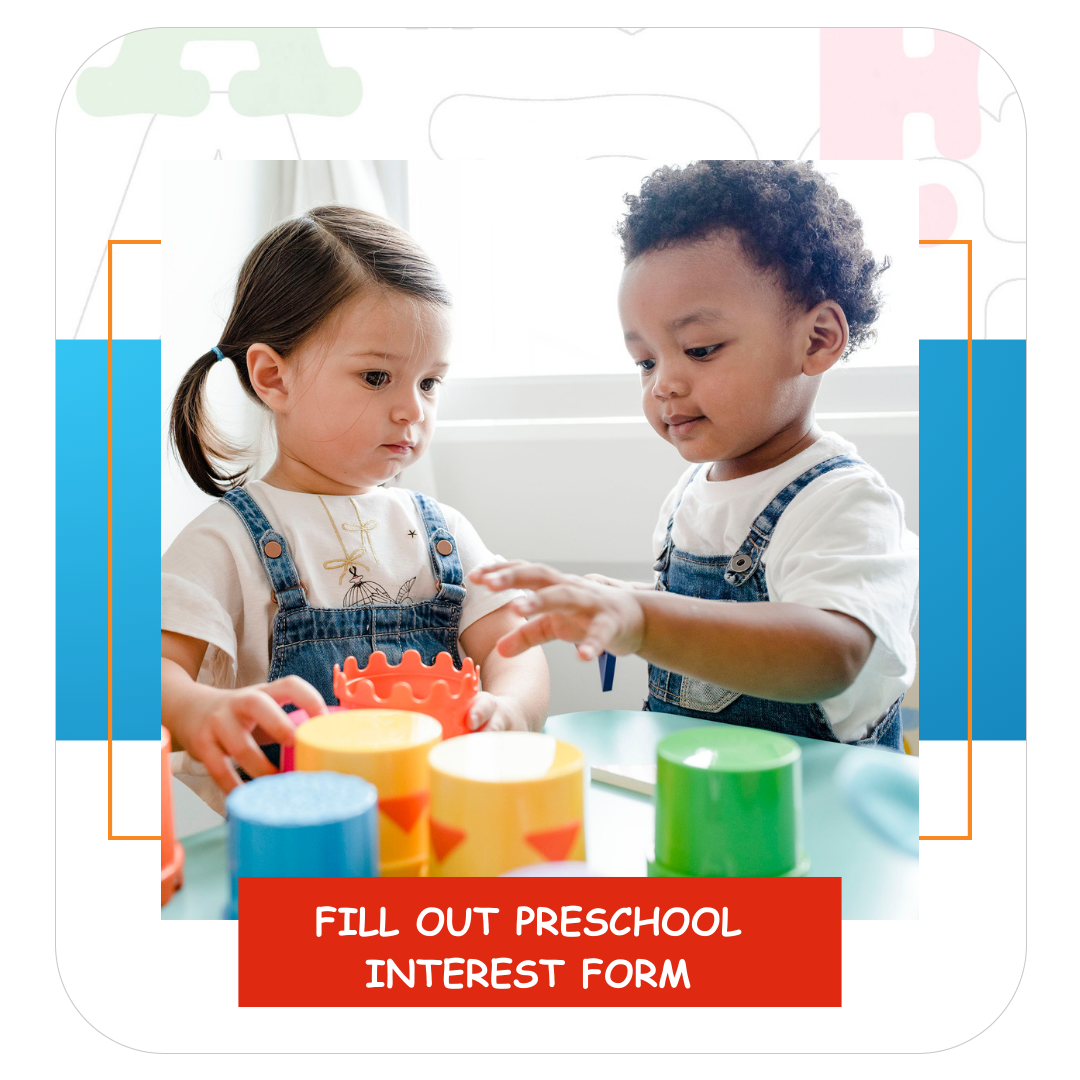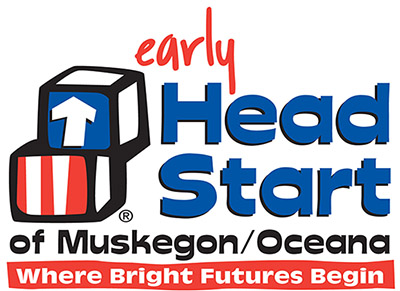
Early Head Start of Muskegon/Oceana
 Want to Learn About Preschool Options?
Want to Learn About Preschool Options?
If you are pregnant and/or have children of ages 0-5, you've come to the right place! By submitting an interest form, we can help you find the best possible program for your family. This is not an application and completing this form does not guarantee placement. Once we receive your information, an enrollment team member will contact you within 5 business days.
Click the icon to connect to the form.
What is Early Head Start?
Early Head Start (EHS) is a federally funded community-based program for low-income families with infants and toddlers and pregnant women. The mission is simple:
- to promote healthy prenatal outcomes for pregnant women,
- to enhance the development of very young children, and
- to promote healthy family functioning.
EHS is built on the following principles for serving children and families: High Quality & Comprehensive Services, Prevention and Promotion, Positive and Continuous Relationships with Children and Families, Parent Involvement, Inclusion of all Children, Cultural Sensitivity, Flexibility and Responsiveness, Transitions into Head Start or other pre-k programs, and Collaboration with Community Partners.
How is ‘Early Head Start' different from 'Head Start'?
Head Start serves three- and four-year-old children with comprehensive preschool and child development services. The MAISD partners with area school districts to serve 666 Head Start children throughout Muskegon and Oceana counties. The program’s main goal is to provide a high-quality, comprehensive preschool program and thus help prepare children for success in school and in life. All children in Head Start are served in pre-school classrooms, whereas in Early Head Start pregnant women and children are served in the home.
Is my child eligible for Early Head Start?
Pregnant women and children (birth to three years of age) qualify for Early Head Start in a number of ways:
- Family income
- A child aged infancy through two and one-half years old
- Pregnancy
- A family receives certain types of public support for the child (such as TANF or FIP payments, child care subsidy, SSI payments, etc.)
- Foster Child
- A child qualifies under the federal definition of homeless
Rather than trying to figure out by yourself whether your child qualifies, it is best to speak with an Early Head Start staff member. Please call 231-767-4365 for assistance.
Are certain families given priority for acceptance into the program?
Yes. Because so many families and children are eligible to participate in Early Head Start, federal rules require the local program to develop “priorities” for acceptance into the program. Women and children fitting into these priorities receive “preference points,” but anyone who is eligible for Early Head Start may and should apply.
Based on community data, the following priorities have been identified in Muskegon and Oceana counties:
- Children of current teenage mothers
- Pregnant women who have a history of mental health needs and/or abuse
- Families enrolled in alternative, adult education, or workforce development programs
- Children with a disability or who are participating in Early On
Persons must also meet one of the income eligibility guidelines listed in the prior question in order to be considered for participation in Early Head Start.
How much does Early Head Start cost?
There is no cost to attend Early Head Start. It is free to eligible children and expectant mothers.
When should my child apply to Early Head Start?
Applications are taken at any time during the year.
What is required to apply to Early Head Start?
Initial documentation needed to be considered for enrollment:
Completed Early Head Start application
Signed Program Requirements
Proof of family income
Additional documentation required upon enrollment:
The child's latest immunization records and health exam,
including health history records
Copy of the child’s birth certificate
Emergency contact information
If any document is not available, Early Head Start staff works with families to get them completed. Please call 231-767-7264 for assistance.
Why are there waiting lists for Early Head Start?
The federal government gives Head Start of Muskegon/Oceana 165 “slots” for Early Head Start. Unfortunately, community data shows that more than 2,000 persons are eligible to receive Early Head Start services. Therefore, waiting lists are often very large to attend Early Head Start.
Regardless of waiting lists, anyone interested in participating should apply. If you don’t apply, there is no way to get into the program!
Can my child attend Early Head Start with a disability?
Absolutely. More than ten percent of all children attending Early Head Start have special needs. Head Start staff works closely with Early On and local special education departments to ensure proper placement and services for any child with an Individual Family Service Plan (IFSP) or Individualized Education Plan (IEP).
How often are meetings with an Early Head Start Worker?
Early Head Start families receive home-based services on a weekly basis.
A one and one-half hour visit is made to the home by an Early Head Start Family Services Worker.
Are parents involved in Early Head Start?
Parents are key to a child’s development and learning. Parent involvement is critical to forming a good partnership with Early Head Start. Early Head Start staff works with families providing numerous at-home activities for parents to work on with their children. These at-home activities are great ways for parents to help their child grow to be great learners! Monthly socialization meetings are held so EHS families can come together to learn and have fun. Parent and family nights are also held at each Head Start site throughout the two counties at which EHS families are encouraged to attend and form friendships with Head Start families. EHS parents also have the opportunity to serve in leadership roles making decisions about the program through the Policy Council.
Overview of Early Head Start Home-Visiting Program
Program Overview
Home visiting is a family-centered concept of bringing services to the home where the child and parent(s) are comfortable and at ease. The parent/guardian plays a key role in his or her child's learning and development. The Family Service Worker fosters this relationship by providing activities and plans for learning, using many things already in the child's home. During a home visit, many fun and different areas of child development will be covered.
Home Visits lasts 1 1/2 hours for one child and a total of two hours for two or more children. Parents should plan on being available for the entire length of the visit. The parent(s) and child need to be home for scheduled visits. If a home visit must be cancelled, the parent should call the Family Service Worker. If it is not possible to call, the parent should leave a note taped on the door. Home visits require parent participation; it is very helpful when a parent participates in the activities! Parents should join the Family Services Worker and child on the floor if possible.
Participation Agreement
In an effort to enhance quality care of Children, Early Head Start establishes family partnership goals with each family. This allows Early Head Start to support parents, which in turn will support the child's emotional growth and development.
Socialization Activities
Socializations are held two times a month in a designated location. This is to be enjoyed by the parent and the enrolled child. It is encouraged that each family attends at least one socialization event per month. Parents should plan on attending these socialization events. They are great fun for both the parents and the children!
No matter what your child's age, socializations provide parents the following opportunities:
- Be out of the house and meet other parents
- Assist in organizing activities
- Share with other parents
- Learn about safety, nutrition, discipline, toilet learning, music, games, arts and many other topics of interest
- Strengthen your relationship with your child
- A meal or snack for the family
Socialization events will provide your child:
- A routine - large groups, songs, and reading
- Structured activities
- Interaction with peers
- A variety of age-appropriate educational activities
- Encourage social and emotional development
Need more information?
Please contact:


